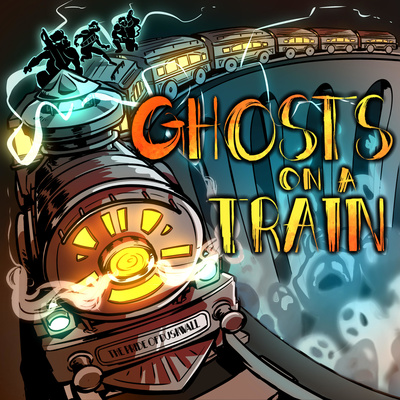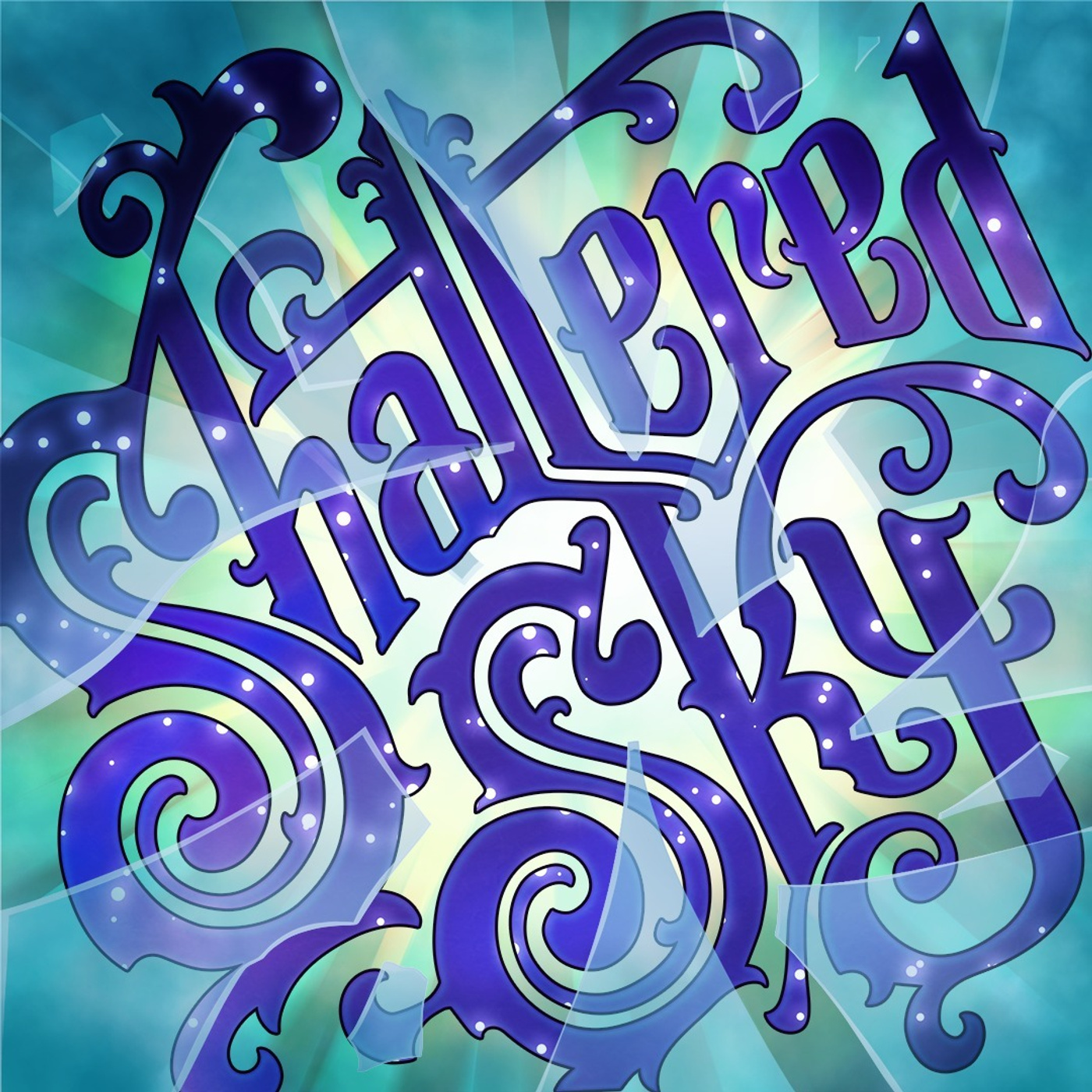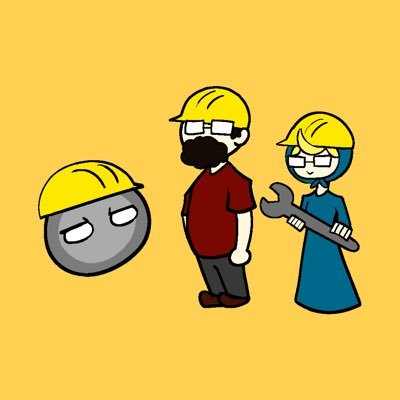I’ve been listening to podcasts since 2005, and recently I realised I wanted to compile my thoughts on them together in one place. So I present you this: a series of thoughts about podcasts I’ve listened to recently, presented as reviews.
List of reviews
By Date:
| Doctor Who: Verity! | 11th October 2020 |
| Ghosts on a Train | 4th October 2020 |
| Shattered Sky | 27th September 2020 |
| Well There’s Your Problem | 27th September 2020 |
I’ve also included some notes on my personal preferences at the bottom of this page, but without any further ado, the latest review:
Ghosts on a Train

| Categories: | Actual Play, Long-form, Steampunk Fantasy, Comedy |
| Status: | Ongoing |
| Released: | 9th April 2020- |
| Episode Length: | 45-90 minutes |
What is it?
A not-so-serious actual play of the Ghost Lines RPG, following the escapades of a mishmash crew of line bulls, protecting a train from ghosts as it travels through the deathlands. (Ghosts Lines is set in the same setting as Blades in the Dark, which you may be more familiar with).
This podcast includes women, and BIMPoC hosts.
You can find Ghosts on a Train here.
My Thoughts
| Review date: | 4th October 2020 |
| Episodes heard: | 1 - 12 |
This podcast was difficult for me at first - people who know me will generally be aware that I don’t like comedy fiction that much, and the premise of Ghosts on a Train seemed like it would be grating - a comedy podcast in a dark and serious setting? That sounds like a recipe for a disastrously tedious story. But I didn’t give up on it, and I’m very glad that I didn’t!
After just a couple of episodes, I realised I was finding the characters endearing, and the episodes themselves enjoyable. Unexpectedly, the extreme contrast between the grim tone of the setting and the irreverent tone of the main characters actually enhances both.
Actual play podcasts where the players are mostly goofing off are typically unenjoyable and tedious. The main difference that makes Ghosts on a Train work is that the more rigid structure of the game Ghost Lines creates a sense of narrative motion that would otherwise be absent. The game alternates between Working a Line, where the characters have to fight off ghosts to protect the train, and Layovers, where the characters get a chance to relax and work side jobs.
As such, there aren’t many chances for the characters to be aimlessly messing around - their exploits are almost always on the job, and in reaction to events that are happening, intertwining the narrative and the humour together, and sidestepping any feelings that the humour is just filler.
Of course, this is not just the game, but also the cast. They’ve created a crew of characters which are all goofy, but all unique in their own ways, and they are performed in distinct and engaging ways. I occasionally find their jokes to go on a bit too long, but I feel that’s more my predilection against comedy than a genuine negative mark against them, and the fact that each episode* moves the story forward in some way means that these feelings don’t last long.
*(except the bonus episode)
Unlike many actual play podcasts, this one includes sound effects in the background - the chugging of the train, the electic crackle of lightning hooks, and the ominous alien sounds that accompany the ghosts. They provide enough ambience to keep the listener interested, but without getting in the way… mostly. There are some occasions of background noise weirdness (like the train noises stopping for a few seconds before starting again, or the ghostly ambience being a little too prominent in the mix), but these are relatively rare and only distract for a moment.
Overall, this is a podcast you can rely on for a fun and casual time. If you’re a fan of light-hearted goofing around, but also want your stories to keep to a structured narrative, then Ghosts on a Train is highly recommended.
If you want to listen to Ghosts on a Train, starting from episode 1 makes the most sense, but it is light enough that you might be able to jump in at the latest episode. You can find Ghosts on a Train here.
Shattered Sky

| Categories: | Actual Play, Long-form, Gaslamp Fantasy |
| Status: | On hiatus, but planned to return |
| Released: | 1st January 2020- |
| Episode Length: | 1 hour |
What is it?
A long-form actual play podcast set in a fantasy world, approximately 100 years after a series of apocalyptic events that unleashed monsters, spread a plague, and broke the sky.
This podcast includes women, nonbinary, BIMPoC, and LGBTQIA+ hosts.
You can find Shattered Sky here.
My Thoughts
| Review date: | 27th September 2020 |
| Episodes heard: | 1 - 9 |
Shattered Sky is a fantastic podcast. The setting is very unique and creative - it takes inspiration from fantasy, steampunk, science-fiction, horror, and post-apocalyptic genres without ever veering too close to one. It’s a rich mixing pot for story threads to develop and grow, and they definitely do - in almost every episode released so far, the story has expanded in ways that intrigue and inspires.
The cast of characters is wonderful - each character has their own focus, their own perspective, and their own hidden depths. The story is presented in such a way that none of the characters feels like the most important character, they all drive the story forward in their own way. Unlike more conventional team-based actual plays, the characters often end up in situations where they are on their own, or only accompanied by one other member of the cast. This leads to a number of really fascinating scenes where they get the opportunity to show a side of their character that we may not have known if they had been kept all together as a group.
One unique aspect of this podcast is the editing style. Instead of merely editing table discussion out of the episode, entire scenes (or parts of scenes) which may not have been that interesting are replaced with narration from the GM that was written and recorded after the fact. This narration never replaces important character scenes, but it frequently replaces scenes like “this character goes to this location” or “this character spends time researching in the library”. The net result of this narration is a production that feels smooth and well planned, despite being mostly improvised.
The narrated scenes are accompanied by background music, which re-establishes the tone and setting and provides a grounding point, before fading away when it’s time to return to a performed scene, leaving the listener immersed while also allowing them to focus in on what’s important.
I’m excited to hear where this podcast goes next, and I’m looking forward to its return.
If you want to listen to Shattered Sky, start from episode 1. You can find Shattered Sky here.
Well There’s Your Problem

| Categories: | Discussion, Semi-educational, Humour |
| Status: | Ongoing |
| Released: | 26th September 2019- |
| Episode Length: | 1-2 hours |
What is it?
A podcast about engineering disasters, with jokes and slides. As it does have a visual component, it’s best to watch it, however most episodes still work without the visuals, to a certain extent.
This podcast includes women and LGBTQIA+ hosts.
You can find Well There’s Your Problem with slides on youtube or as a podcast on podbean.
My Thoughts
| Review date: | 27th September 2020 |
| Episodes heard: | 10 assorted episodes between eps 15 and 40 |
I really wanted to like Well There’s Your Problem. I had heard a few things about it from friends, and eventually I listened to episode 15, which is about the Advanced Passenger Train - an early tilting train design that faced several troubles throughout its development. It was a great episode - there were a lot of interesting details to learn, and the hosts interacted and made jokes in a natural and entertaining way.
The length of the episode was a problem - for a discussion show, 1h 45m is rather extreme. At the time, however, I wasn’t worried about this - the hosts commented about the length of the episode being unusual, and most of their previous episodes were only around an hour long. Unfortunately, this was not to last. Subsequent episodes sprawled out in length - at time of writing, the latest 7 episodes are all over 1.5 hours long, with 3 of those being over 2 hours long.
I did not let this stop me, however, and I proceeded to listen to several of the episodes, skipping a few that didn’t sound interesting to me.
The hosts are pretty entertaining - they have a variety of levels of knowledge about engineering, and for each disaster they do a varying amount of research, which allows the show to include a back-and-forth where specific issues are clarified and discussed in a more accessible way. Frequently they go on silly tangents, riffing on the parts of the problem that have been presented so far, which gives this show its distinct flavour. These tangents can often be quite funny, and occasionally they can smoothly lead back into questions on how a certain engineering principle works.
But sometimes, their jokes degrade into irony-poisoned grim humour, in the style you often see on leftist twitter, and it doesn’t take long for that style of humour to become tedious. This is a point where I think more editorial control should be asserted - not every one of these tangents leads anywhere, and they’re not all entertaining all the way through. Trimming some of the tangents out of the episode would do wonders for a stronger sense of pacing and cohesion.
This leads me to the regular segment: The Goddamn News. Before discussing the episode’s disaster, the hosts talk about a recent headline or two. Now, this segment could be quite fun - if they went for a headline that was something silly happening, or something little-known, or related to engineering disasters. But frequently, the headline is just whatever twitter has been talking about recently - people refusing to wear masks during a pandemic, politicians saying nonsense, that sort of thing. As such, it kinda ends up being a double-whammy - not only do you need to hear about something crappy again, but by neccessity the kind of jokes they make about it are rather grim and cynical.
It doesn’t seem like this segment does much, aside from delaying the meat of the episode by an extra 10 minutes. Perhaps this segment has some appeal to the fans of the show that I’m missing, but it feels like a frivolous and frustrating aside that takes more away from the podcast than it adds.
The podcast has another regular segment: Safety Third, wherein they discuss situations where people’s safety was put at risk by the actions of a company, but no disaster actually occured. This segment comes at the end of the show, and it works very well - by adding a space after the disaster discussions, the listener has space to wind-down.
Overall, it’s hard to recommend this podcast. I definitely have enjoyed episodes, and I know people who really love it. But at the same time, listening to the episodes can often be a struggle, with several frustrations to endure before getting to the parts of the show that really work.
If you want to listen to Well There’s Your Problem, I enjoyed Episodes 15 (Advanced Passenger Train), 30 (Austrian Wine Tainting Scandal) and 33 (Pier 34 Collapse). You can find Well There’s Your Problem with slides on youtube or as a podcast on podbean.
Some Notes
Some notes on my preferences:
- Most of the podcasts I listen to are story-focused.
- I don’t usually enjoy comedy fiction. Dramas with humour? Sure. Comedy skits? Maybe. But a comedy story is not to my tastes, with only a few exceptions.
- I don’t binge-listen to podcasts. I used to, but I kept finding myself burnt out by podcasts with long archives. So now I listen to a rotating schedule of 5 podcasts, which helps me mentally (because I get to listen to a wide variety of stuff), but it means that it can take much much longer to get through the archives of any particular podcast.
- The length of a podcast is less important than how much that podcast respects my time.
A quick note on Actual Play podcasts
An Actual Play podcast is a kind of improvised fiction podcast where the cast plays a story game or role-playing game at a table together.
I really enjoy actual play podcasts, but I almost never listen to Dungeons & Dragons podcasts, even though they’re often quite popular. I have several reasons for this, but the big one is: I’d rather recommend people towards stuff they may not have heard before, and encourage them to try games other than the most famous one.
I put Actual Play podcasts into three categories:
- A Long-form podcast is one that tells one long story, often divided into seasons, much like a tv show.
- A One-shots podcast is one that tells a number of very short stories, about 1-3 episodes each.
- A Variety podcast is one that tells several medium-length or longer stories (4+ episodes), with each season of episodes typically featuring new characters in a new setting (and often in a new game).
Frequently, a Variety podcast will also feature one-shots between longer stories.
Ratings
I don’t give any of these podcasts a numerical score, or a rating out of 5 stars, or any such thing. I don’t think those are anywhere near as valuable or useful as simply telling you why I like (or dislike) something, which you can then use to inform your own decisions.
And in my case, any rating that I’d give would be very arbitrary - what’s the difference between 3 stars and 4 stars? If I think a podcast is well made but it doesn’t exactly appeal to me, should I give it a higher rating or a lower rating? What does giving a podcast 1 star actually represent - dismay, disappointment, boredom? And similarly, what would giving it a 5 star rating mean?
Ratings might be useful in aggregate - you could scroll through my list of podcasts and see which ones I give the highest ratings to - but they’re not useful within any other context.
If you do want to have a quick look and you don’t want to read all of my words, the last 2 paragraphs of every review are my overall recommendation and a suggested starting point.